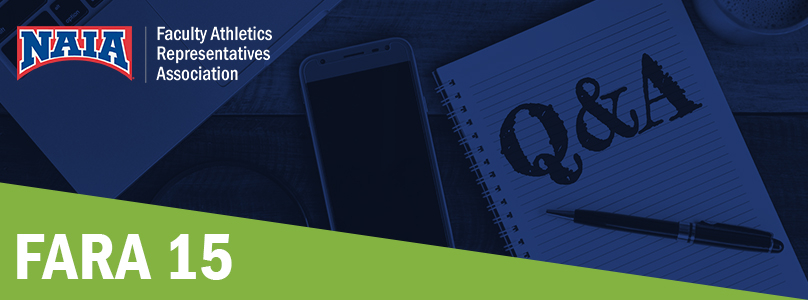Member Spotlight - Dr. William Hervey


|
Name: Bill Hervey Position: Professor, Middle Georgia State University Number of years in the position: 20 years as Professor, 5 as FAR Alma Mater: St. John’s University School of Law Hometown: Bethpage, NY Classes taught: Health Law, Healthcare Economics, Bioethics |
The FARA 15
- How did you become an FAR?
I was the faculty member on the University’s committee that oversaw MGA’s entry into the NAIA in 2014. Being familiar with the processes, I stayed on as FAR.
- What is your favorite part of being an FAR?
Getting to know the student-athletes, coaches and staff on the athletics side of the school has been a great experience. As faculty members, we can get isolated from others in the institution. As FAR, I’ve been able to learn much more about other people, parts and processes of my institution.
- What is the biggest challenge of your job?
Dealing with changes in student schedules in those sports that begin in the early fall semester can be challenging.
- If you could go back to your first day as an FAR, what would you tell yourself?
I would tell myself to not get lost in the apparent complexity of the eligibility process, but to break it down into a series of individual tasks. Once you do that, it becomes much more manageable.
- What is your favorite show/movie?
The Godfather, Parts I and II. I know that’s 2 movies, but like with your kids, you can’t pick just one of them. Part III, eh, not so much.
- What has been the highlight of your time as an FAR?
No doubt, working with and getting to know SSAC Eligibility Chair Ron Melton. I’ve come to appreciate how his knowledge and helpfulness to us and others are exceeded only by his passion for the NAIA and its student-athletes. I was sitting with Ron in the hotel lobby during the 2015 NAIA Convention when the Houston Rockets basketball team came through. I could tell he was looking at James Harden and the others and thinking about the amateur status rules and Brewton Parker.
- What is the best piece of advice you have ever received?
“Just because you have a right to do something does not mean it’s the right thing to do.”
- What can you not live without?
Coffee. Followed by friends and family.
- Who are your favorite teams (other than your school of course)?
NY Mets by a longshot. Followed by Atlanta Braves, and then whoever is playing the NY Yankees.
- Who was your most memorable or inspiring student that you have worked with and why?
Not a student athlete, but a nontraditional student named Scott who at 35 years old lost a leg to MRSA. He only missed a week of school, and then came to class in a wheelchair. Within a year he was running 10Ks again with an artificial limb.
- How does your school approach certifying students in the ECP software?
The coaches provide me with a roster sheet containing the names and seasons played. I, as FAR, look up and enter the required data into the Eligibility certification paperwork, and then send it to our Registrar who double checks the academic details. He returns it to me with comments or corrections, and I finalize it, and post it onto the ECP software for review and sign off by the required signatories. I always designate accepted last in case the others find a last minute issue.
- What do you like to do in your free time?
My wife and I love to travel, and do so as often as we can. I spend free time at home either floating in my pool (living in middle Georgia has its benefits) or reading.
- If you have a question related to your position as FAR, who do you contact?
SSAC Eligibility Chair Ron Melton, and the NAIA folks in Kansas City have always been helpful also.
- Do you have any pets?
An 8 year old asthmatic Chihuahua named Trixie, who has the mind of a rock and the personality of a Yankees fan. But I love her anyway.
- How do you navigate being a part of two different departments on campus?
I was an administrator for a long time, so I have the advantage of knowing some of the inner workings of our systems. But my main strategy is to be as transparent as possible. Explaining to people (athletes, coaches, administrators and faculty) why you are doing something or need certain information helps the process tremendously. Also being proactive with communication is important, since most people hate surprises.
View more FARA 15 Member Spotlights here.






